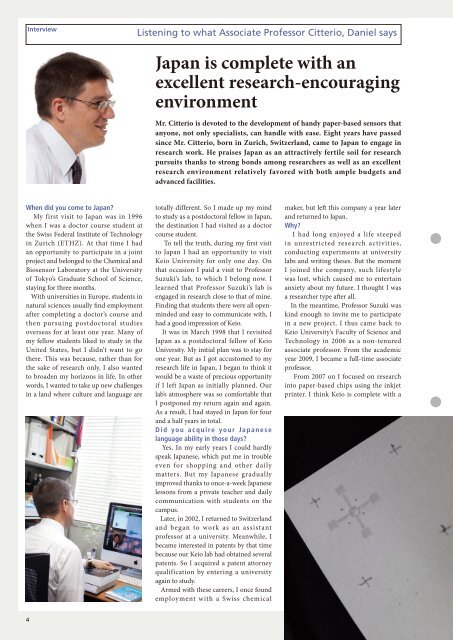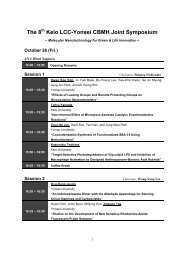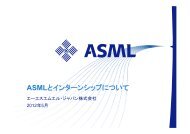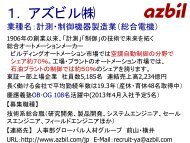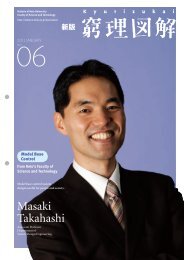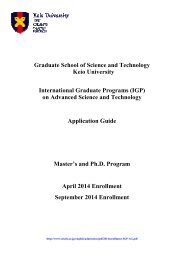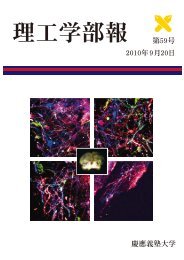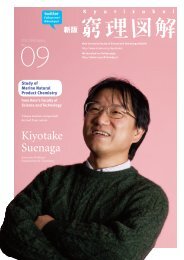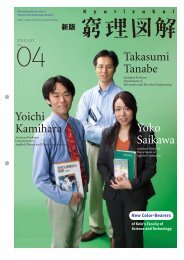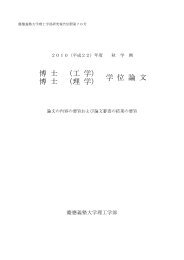Citterio, Daniel - Keio University
Citterio, Daniel - Keio University
Citterio, Daniel - Keio University
Create successful ePaper yourself
Turn your PDF publications into a flip-book with our unique Google optimized e-Paper software.
InterviewListening to what Associate Professor <strong>Citterio</strong>, <strong>Daniel</strong> saysJapan is complete with anexcellent research-encouragingenvironmentMr. <strong>Citterio</strong> is devoted to the development of handy paper-based sensors thatanyone, not only specialists, can handle with ease. Eight years have passedsince Mr. <strong>Citterio</strong>, born in Zurich, Switzerland, came to Japan to engage inresearch work. He praises Japan as an attractively fertile soil for researchpursuits thanks to strong bonds among researchers as well as an excellentresearch environment relatively favored with both ample budgets andadvanced facilities.When did you come to Japan?My first visit to Japan was in 1996when I was a doctor course student atthe Swiss Federal Institute of Technologyin Zurich (ETHZ). At that time I hadan opportunity to participate in a jointproject and belonged to the Chemical andBiosensor Laboratory at the <strong>University</strong>of Tokyo’s Graduate School of Science,staying for three months.With universities in Europe, students innatural sciences usually find employmentafter completing a doctor’s course andthen pursuing postdoctoral studiesoverseas for at least one year. Many ofmy fellow students liked to study in theUnited States, but I didn’t want to gothere. This was because, rather than forthe sake of research only, I also wantedto broaden my horizons in life. In otherwords, I wanted to take up new challengesin a land where culture and language aretotally different. So I made up my mindto study as a postdoctoral fellow in Japan,the destination I had visited as a doctorcourse student.To tell the truth, during my first visitto Japan I had an opportunity to visit<strong>Keio</strong> <strong>University</strong> for only one day. Onthat occasion I paid a visit to ProfessorSuzuki’s lab, to which I belong now. Ilearned that Professor Suzuki’s lab isengaged in research close to that of mine.Finding that students there were all openmindedand easy to communicate with, Ihad a good impression of <strong>Keio</strong>.It was in March 1998 that I revisitedJapan as a postdoctoral fellow of <strong>Keio</strong><strong>University</strong>. My initial plan was to stay forone year. But as I got accustomed to myresearch life in Japan, I began to think itwould be a waste of precious opportunityif I left Japan as initially planned. Ourlab’s atmosphere was so comfortable thatI postponed my return again and again.As a result, I had stayed in Japan for fourand a half years in total.Did you acquire your Japaneselanguage ability in those days?Yes. In my early years I could hardlyspeak Japanese, which put me in troubleeven for shopping and other dailymatters. But my Japanese graduallyimproved thanks to once-a-week Japaneselessons from a private teacher and dailycommunication with students on thecampus.Later, in 2002, I returned to Switzerlandand began to work as an assistantprofessor at a university. Meanwhile, Ibecame interested in patents by that timebecause our <strong>Keio</strong> lab had obtained severalpatents. So I acquired a patent attorneyqualification by entering a universityagain to study.Armed with these careers, I once foundemployment with a Swiss chemicalmaker, but left this company a year laterand returned to Japan.Why?I had long enjoyed a life steepedin unrestricted research activities,conducting experiments at universitylabs and writing theses. But the momentI joined the company, such lifestylewas lost, which caused me to entertainanxiety about my future. I thought I wasa researcher type after all.In the meantime, Professor Suzuki waskind enough to invite me to participatein a new project. I thus came back to<strong>Keio</strong> <strong>University</strong>’s Faculty of Science andTechnology in 2006 as a non-tenuredassociate professor. From the academicyear 2009, I became a full-time associateprofessor.From 2007 on I focused on researchinto paper-based chips using the inkjetprinter. I think <strong>Keio</strong> is complete with a4


